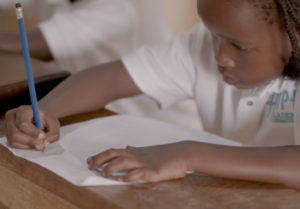Our goal at Hope Academy is to become the best school in all of Africa. In addition to meeting the needs of underserved people and offering a quality educational experience for all of our students, we also aim to provide a well-rounded, comprehensive curriculum that educates the whole child and prepares them for their futures beyond school. Each curriculum program we utilize not only meets the standards of the country the children reside in, but they also teach them even more. We go above and beyond to help students build strong foundations and excel on their national exams so they can continue their education into high school and beyond. Here is a breakdown of each different curriculum program we use and how they help students thrive both in school and beyond.
English
Our English curriculum is a UK-based program that helps students become proficient in English, including in speaking, reading, and writing. We aim to help our students become fluent speakers and establish strong language foundations so that they can build on them in the future.
Math
Our math curriculum is also UK-based, and it was designed with the intention of sparking creativity, excitement, and innovation in students. It’s meant to nurture confidence in math basics, encourage critical thinking, improve problem-solving, and more.
Phonics
We utilize a Ugandan-based phonics curriculum that builds proficiency in basic phonics skills, giving kids the best chance at mastering language, reading, and writing skills from an early age.
Science
Another Ugandan-based curriculum, our science program teaches students all about agriculture. Its goal is to prepare students to work in agriculture within their country, as this rapidly-growing industry is also pivotal in improving the lives of Africans in nearly every community across the continent.
Christian Religious Education (CRE)
As a faith-based school, Hope Academy utilizes a Ugandan curriculum to teach our students the basics of Christian education. This helps them be prepared for their national exams and gives them a foundation in Christian truths.
Bible
Going beyond the basics of CRE, our US-based curriculum teaches more advanced Biblical principles and explores the life of Jesus, teaching children what they need to know to live, love, and act like Jesus.
Art
Our Ugandan-based curriculum teaches students creativity and expression through art. They utilize resources available in their particular regions and learn basic artistic principles and techniques to express themselves and interact with their worlds.
Music
Music instruction, particularly in young children, has countless benefits in the areas of brain development, language skills, speech perception, and reading ability. Our US-based music curriculum teaches students foundational music skills and encourages self-expression through music.
Physical Education
With an online-based format, students will learn about the importance of staying active and will participate in various physical activities. They will enhance their balance, strength, and coordination through fun and engaging movements and exercises.
Handwriting
As an essential skill for everyone to master, handwriting instruction is approached with a positive attitude and growth mindset. Our US-based handwriting curriculum addresses all types of learners and helps improve fine motor skills, spatial awareness, and more.
Health
Our comprehensive health curriculum approaches wellness from a personal and social perspective. It instructs students on taking care of their bodies, connecting with themselves and others, mental health awareness, and how to face and overcome challenges.
It is with great joy that we implement each of these curriculum programs, as each was handpicked by our educators, board members, and school leaders. We believe in the efficacy of each program to meet the children where they are and to instruct them as individual people who will one day contribute to their own communities. Our comprehensive approach to education helps students achieve well beyond the minimum standards in each country, and we are grateful for the opportunity to serve these future leaders and meet a big need in this amazing place.
Won’t you join us in preparing these children for their very bright futures? Help us create change in Africa for generations by giving today through Tithely on our website. You can contribute a one-time gift or sign up for monthly giving to ensure your ongoing impact.


